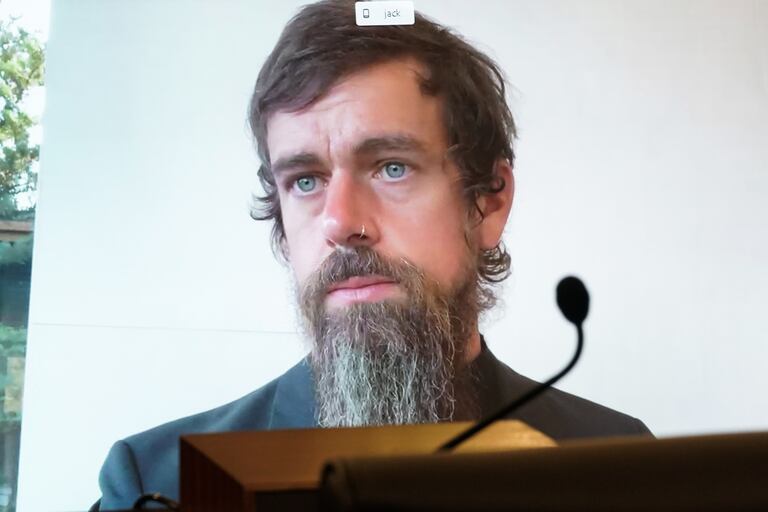Jack Dorsey, CEO of Twitter, in his telematic appearance before the senators.Greg Nash / Getty Images
The Silicon Valley aristocracy has returned to the Capitol.
Two powers, that of the old politics and that of the new economy, face to face.
Virtually, this time, due to the pandemic.
An unusual image not so long ago, which is on the way to becoming normal: it is the fifth time in three years that Mark Zuckerberg (Facebook) has appeared, the third for Sundar Pichai (Google) and Jack Dorsey (Twitter).
But the fact that this appearance before the senators occurs six days before a red-hot election, in which the behavior of their creatures will be scrutinized, has made this Wednesday's public hearing something exceptional.
The reason for the hearing was to debate the so-called Section 230, precept of the Communications Decency Law of 1996, which frees technology companies from responsibility for the content published on their platforms, even if they break the laws.
Critics say the law gives tech companies too much power over what can or can't be posted on their platforms.
The companies defend that, without the norm, communication on the Internet would be little less than suppressed and social networks, as they are understood today, would cease to exist.
Under Section 230, and in the context of an election campaign, these companies face pressure to manage disinformation on their platforms without unfairly influencing the electoral process.
A complicated balance in which, according to Republicans and Democrats, for basically opposite reasons, social networks are failing.
Republicans see companies as overreaching restraint and silencing conservative voices;
Democrats accuse them of not doing enough to ban fake news and illegitimate interference from their platforms.
Section 230, which has helped social media become the giants they are today, has become particularly contentious over criticism from President Trump and Republicans, who view social media as having a bias against conservatives.
Those accusations, without factual basis, which occurred again after Twitter and Facebook limited the dissemination of a controversial New York Post information that attacked the Democratic candidate Joe Biden and his son, have focused the criticism of the Republican majority.
And they have put executives on the ropes on more than one occasion:
"Mr. Dorsey, who the hell has chosen you, and put you in charge of what the media can report and what the American people can hear?"
And why does he insist on behaving like a financier of the Democrats, silencing the views contrary to his political beliefs?
- Republican senator Ted Cruz has released to the founder of Twitter.
The CEO of Twitter has monopolized much of the attacks from Republicans.
They have asked him why his social network adds warnings of possible false information to Trump's tweets and not to those of "a Holocaust denier like Ayatollah Khamenei."
Dorsey has defended himself by saying that he cannot influence the elections because Americans have many channels through which to inform themselves.
And he has acknowledged that the decision to block the controversial article in the
New York Post,
which was made for a policy of not disseminating materials obtained by hacking, was "incorrect" and that they have already corrected it.
Democrats have drawn attention to the date chosen by the Republican majority to hold the hearing, just six days before the elections, and have lamented that their rivals, in the words of Democratic Senator Amy Klobuchar, have “politicized what should not be a partisan issue ”.
The recipient of your questions has been, mainly, Mark Zuckerberg, founder of Facebook.
Democrats wanted to know what their company, which was a vehicle of disinformation in the last elections, was doing to prepare for the elections next Tuesday.
Facebook, Zuckerberg explained, has more than 35,000 employees dedicated to content moderation and has invested billions of dollars in election security.
Donald Trump has wanted to join in what constitutes one of his fetish battles.
“The United States does not have freedom of the press, we have suppression of information.
We've learned a lot in the last two weeks about how corrupt our media is, and now Big Tech, maybe even worse.
Repeal Section 230! ”, The president tweeted, paradoxically, through the same platform he accuses of censoring him.
You can follow EL PAÍS TECNOLOGÍA RETINA on Facebook, Twitter, Instagram or subscribe here to our Newsletter.

